You’ve likely landed here because you received the frustrating “Promosm” comment on your YouTube video and are curious about its meaning.
The term “Promsm” can vary in meaning depending on the situation and context. Typically, “Promsm or Promo SM” is an abbreviation for “Promote Social Media” or “Promote and Spam.”
Additionally, in a different context, it refers to a website (promo.com) that provides services aimed at enhancing one’s social media presence by increasing likes, followers, views, comments, and more.
In this blog post, I will explain in detail what does promosm mean in YouTube comments.
What does promosm mean?
Definition of promosm in various contexts
1. Promosm: A Combination of Two words “Promotion and Social Media”
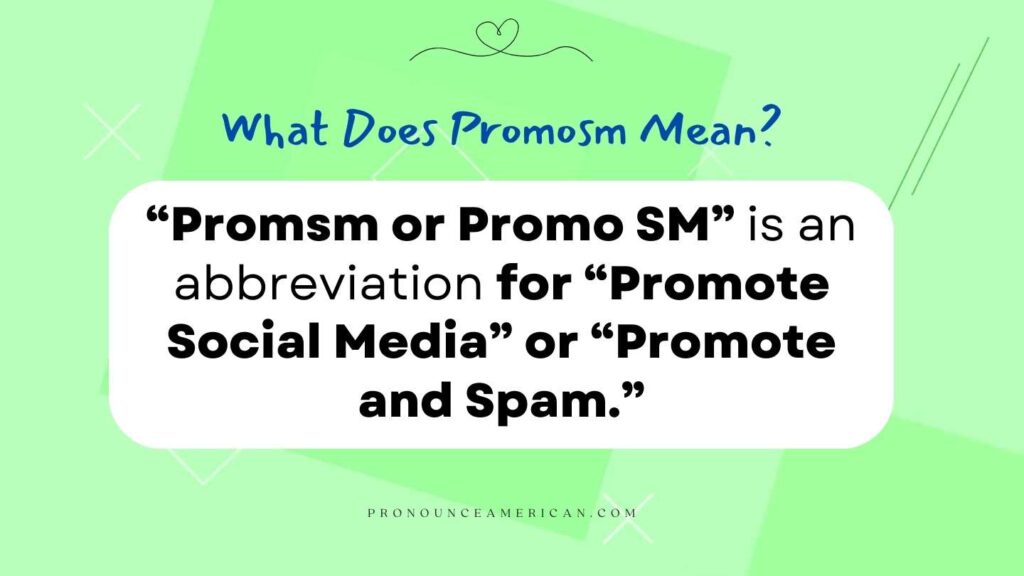
Promosm is a term that combines the words “Promotion” and “Social Media”. It refers to marketing strategies that aim to promote a product or service to potential customers.
2. Promosm : An online website offering social media presence boosting
Promosm is an online website that offers services to enhance social media presence. PromoSM[dot]com is designed to help individuals or businesses boost their social media profiles by increasing the number of followers, likes, and views.
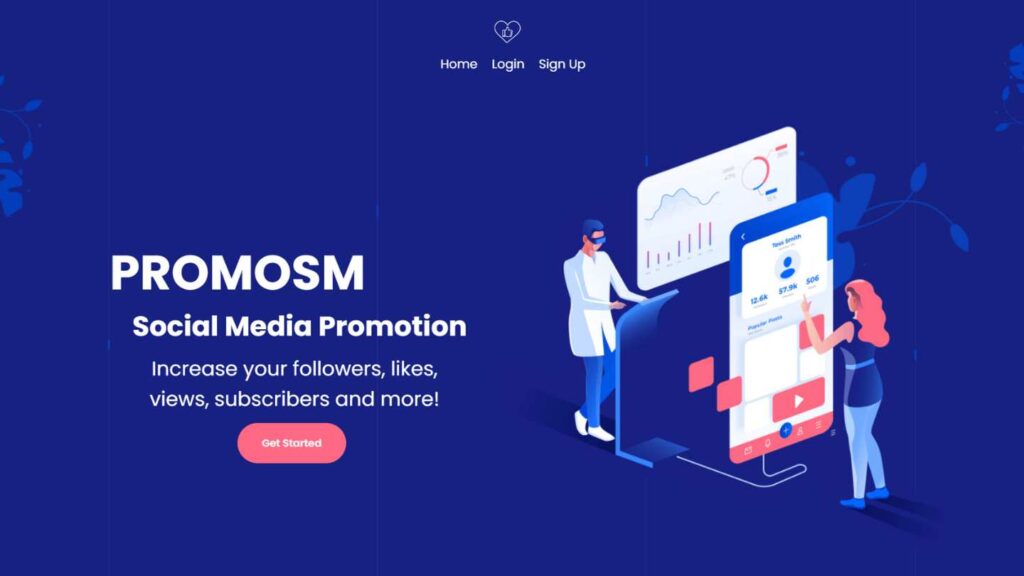
What does promosm mean in youtube comments
Promosm: “Promote so much” or “self-promotion” or Promote and Spam
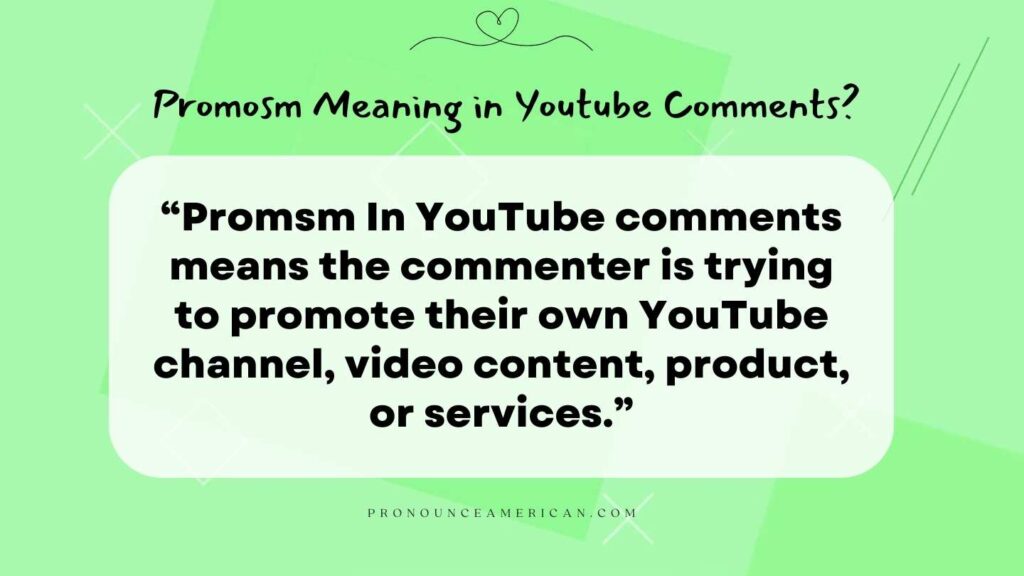
The term promsm In YouTube comments means that the person who left the comment is trying to promote their own YouTube channel, video content, product, or services. This comment is usually considered as spammy and discouraged in the YouTube community. The main purpose of these comments is to gain attention or drive traffic to their channels, video content, products, or services.
Origin and usage of the term promosm
Promosm is one of the popular term on social media like Gyatt slang. This term promosm originated when people started promoting their channels, video content, and product or services in cost-free ways like commenting on blog posts, social media posts, YouTube videos, etc.
The usage of the term Promosm is used to build brand awareness among content creators who are struggling to grow their social media accounts and convert them to paid customers.
How is “PROMOSM” Used on YouTube comments?
Here are some examples of “PROMOSM” comments
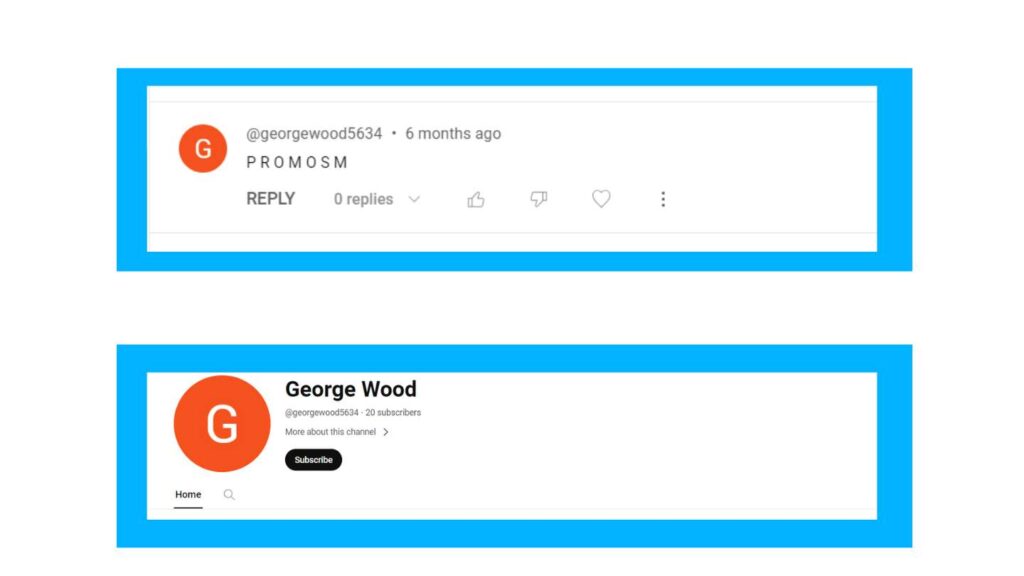
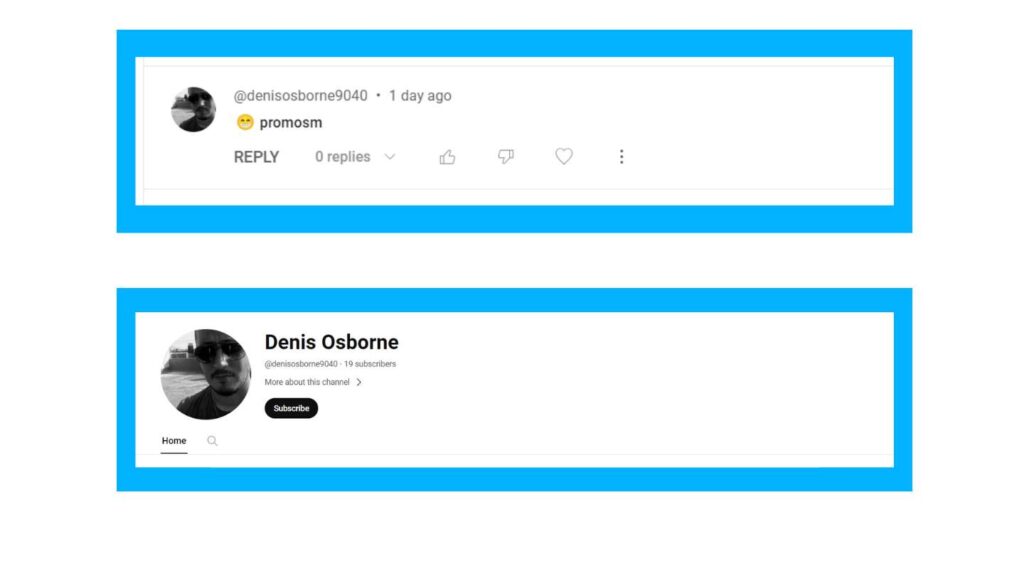
Why Do People Use “PROMOSM” on YouTube Comments?
People use “PROMOSM” in YouTube comments for several reasons. Here’s a breakdown of these reasons into simpler, more informative sentences:
- Growth Struggles: Individuals or entities with YouTube channels, social media accounts, or products may face challenges in growing their audience or customer base.
- Seeking Quick Solutions: For instance, a YouTube channel owner with a small number of subscribers might look for quick ways to reach the 1000 subscriber milestone.
- Following Online Advice: Numerous clickbait videos on YouTube offer advice on rapidly increasing subscriber count, suggesting methods like commenting on high-engagement videos.
- Targeting High-Engagement Channels: A common strategy involves posting comments on videos from channels with significant engagement, such as Mr. Beast’s, right after a new video is posted. These comments often include a message of appreciation followed by a plea for help in reaching 1000 subscribers.
- Chance of Gaining Attention: The hope behind this tactic is that people reading the comments might click through to their channel out of curiosity or goodwill.
- Use by Scammers: Scammers also employ this method to draw attention to their illegal products or services. Since they cannot advertise these offerings through legitimate channels, they resort to dropping comments in the hope of attracting clicks without any financial investment.
- Avoiding Costs: By leveraging the comment sections of popular social media platforms like YouTube, Facebook, and Instagram, these individuals or groups aim to gain visibility without incurring any advertising expenses.
What’s the impact of “promosm” in comments?
The term “promosm” in comments on YouTube videos can have several impacts—both positive and negative.
Here are some key points to consider:
1. Cluttered and spammy environment:
One impact of “promosm” is that it can create a cluttered and spammy environment within the comments section of a video. This can be off-putting for genuine viewers who are looking to engage in meaningful discussion or provide feedback on the content.
2. Difficulty in identifying legitimate comments:
Excessive “promosm” comments can make it difficult for creators to identify and respond to legitimate comments. This can potentially cause a decline in audience engagement and satisfaction.
3. Negative impact on channel visibility:
Artificially inflating engagement metrics, such as views and likes, through “promosm” can have long-term effects on a channel’s visibility and growth potential. YouTube’s algorithms prioritize genuine engagement. So, keep in mind that artificially boosted metrics may negatively impact a channel’s visibility.
4. Risk of violating YouTube’s terms of service:
Purchasing views and likes, which is sometimes associated with “promosm,” violates YouTube’s terms of service. This can risk a channel’s standing and future opportunities. Persisting on this choice guarantees a total loss of your channel, wasting all the time and effort invested.
5. Self-promotion and visibility:
The primary purpose of “promosm” in YouTube comments is to gain visibility and attract viewers to the commenter’s channel or content. Users hope to increase their number of subscribers and overall engagement through self-promotion.
However, it’s important to understand that without unique, engaging, and high-quality content, your channels might not achieve even a 1% conversion rate for gaining new subscribers.
6. Mixed perceptions:
The impact of “promosm” can vary depending on individual perceptions. Some viewers may find it annoying and spammy. Whereas, others may see it as an opportunity to discover new content or engage with creators.
In short, the impact of “promosm” in comments on YouTube videos can be both positive and negative, depending on the context and individual perspectives.
Is promosm considered spam?
Promosm is not necessarily considered 100% spam, but it can be seen as self-promotion. When users leave promotional messages or comments on social media platforms, they may be trying to gain attention or drive traffic to their content.
While some people find this annoying or intrusive, others may not mind it. It ultimately depends on the context and the platform’s community guidelines. If done excessively or inappropriately, it could be perceived as spammy behavior. However, not all promosm are automatically labeled as spam.
Is “PROMOSM” Acceptable on YouTube?
YouTube’s policies aim to balance creators’ needs to share their content with the need to prevent excessive promotional material. “PROMOSM” stands for promotional social media activities. Whether YouTube permits these activities depends on their execution.
Below are the key guidelines and possible outcomes for excessive or inappropriate self-promotion:
YouTube Policies on Self-Promotion and Spam
- Spam, Deceptive Practices, & Scams Policies: YouTube prohibits content that tries to trick viewers for financial gain. It includes spammy links or tags, or is excessively posted with the sole intention of driving traffic to external sites.
- External Links Policy: Links in your content (video description, comments, etc.) must comply with YouTube’s community guidelines. Linking to external sites to sell merchandise or promote channels is allowed. But it should not be misleading or harmful.
- Community Guidelines: These guidelines stress the importance of contributing to the community positively. Excessive posting of repetitive, irrelevant, or untargeted content for promotion can be seen as spam.
Consequences of Excessive or Inappropriate “PROMOSM”
- Content Removal: Videos or comments deemed as spam or violating YouTube’s self-promotion policies can be removed from the platform.
- Channel Strikes: YouTube may issue a strike against a channel for violations. Receiving multiple strikes can lead to temporary restrictions on content upload—or even channel termination.
- Loss of Monetization: Channels engaging in excessive promotional activities not in line with YouTube’s policies might lose their eligibility for monetization through the YouTube Partner Program.
- Viewer Disengagement: Excessive promotion can annoy viewers, potentially causing subscriber loss and reduced engagement. Creators must strike a balance between promoting content and offering value to their audience.
Best Practices for “PROMOSM” on YouTube
- Provide Value: Ensure your content provides value beyond just promoting your products or services.
- Engage Genuinely: Genuinely engage with your audience. Respond to comments and feedback without pushing your promotions too hard.
- Use Appropriate Channels: Utilize the “Community” tab, stories, and other features designed for engagement and appropriate promotions.
- Follow Guidelines: Always adhere to YouTube’s policies when promoting products or services.
In short, while YouTube permits self-promotion to an extent, adhering to its guidelines and prioritizing the creation of valuable content for viewers is essential. Overdoing or engaging in unsuitable promotional practices may have adverse effects on your channel.
Security issues of Promosm Services and YouTube Policies
I don’t recommend using paid promosm services to boost your channel presence since it violates YouTube’s terms and policies. If discovered, your account could face penalties. Exercise caution and avoid such services.
Additionally, there are security concerns, including a high risk of account hacking and phishing attempts. Direct resolution of any issues is unlikely as personal meetings with the service providers are not possible. Moreover, these services require payment without guaranteeing results.
Ultimately, you risk losing not just your money but potentially your social media accounts and sensitive payment information (like credit card, bank account) as well.
Importance of understanding the meaning of “promosm”
To grasp what “promosm” means is essential.
I inquired with my friends who create video content if they had ever encountered such comments on their channels. They confirmed they had but interpreted them negatively, thinking their content was disliked or subpar, merely attempts at promoting other channels.
Upon learning from me that it’s a method of self-promoting their channels or an online service provider differently, they found relief. This revelation seemed to lift a weight off their shoulders, solving a mystery that had puzzled them.
To clarify, if you’re unfamiliar with the term “promosm,” you might interpret it negatively and retain that perception for an extended period.
Best strategies to combat Spam “Promosm” comments
As said, promosm comments on YouTube are often considered as spammy and should be discouraged.
The popular strategies to deal with “promosm” comments can include reporting them as spam or hiding/deleting them when necessary.
1. Delete or Hide from comments
This is the simplest action that can be taken against spam comments. By doing so, the channel owner can maintain the quality and relevance of discussions on their videos. Moreover, this step ensures that viewers remain focused on the content.
However, this action depends entirely on the preference of the video owner. YouTube offers useful tools to delete or hide spam comments, or even to prevent the person (block users) who left the comment from posting future comments.
2. Reporting comments as spam
This is the most effective measure you can take against spammy promotional comments. By reporting these as spam through YouTube’s reporting feature, YouTube will conduct an investigation. If they determine that the user is repeatedly engaging in spammy behavior, they will either block the user or delete their accounts.
Also Read: What is GYAT Slang and What Does GYAT Mean?
What Is Nepotism | Definition, History And Real Life Examples
What Does Vapid Mean? (Simply Explained With Examples)
Read Also:
Conclusion
In summary, “promosm” in YouTube comments refers to efforts aimed at promoting social media presence, self-promotion, or spamming. This tactic involves commenting on highly engaged content of various social media platforms, such as YouTube or Facebook, to draw attention to one’s content, channel, product or services. Essentially—it’s a marketing strategy.
While YouTube permits a degree of self-promotion, crossing the line into spammy behavior risks violating its terms and policies. Such violations can lead to content removal, the disabling of monetization, channel strikes—or even channel termination.
Content creators who encounter these types of comments have options. They can report the comments to YouTube or choose to hide or delete them. This action helps maintain the focus on the video’s content and the relevant discussions among viewers.
FAQs’
What does promosm mean in YouTube comments?
The term “promosm” in YouTube comments refers to the act of promoting or boosting a channel, video content, product, or service. This is done by leaving comments, which may or may not include links on videos. It’s a cost-free marketing strategy to enhance online visibility or channel viewership.
What does promosm mean?
Promosm typically refers to “Promote Social Media” or the concept of promoting self-marketing. Additionally, it represents an online platform (promosm.com) that enhances social media presence through services like increasing views, likes, and subscribers.
What does it mean when someone comments promosm on YouTube?
If someone comments on the term “promosm” on a YouTube video means they are trying to grab the attention of viewers to get some traffic to their channels, video content, or products. They aim to increase subscribers, views, potential sales, and growth.
What does promosm stand for?
Promosm stands for “Promoting Social Media” or “Promote and Spam”. It is widely seen in social media platforms where users leave comments targeting their channels, products or services to grab attention and traffic.


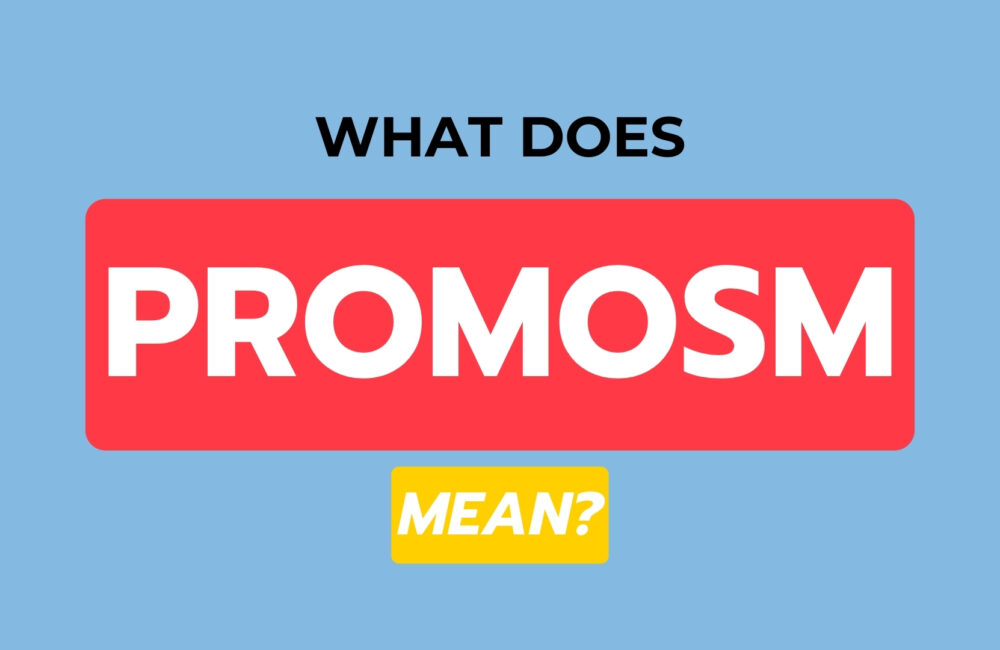


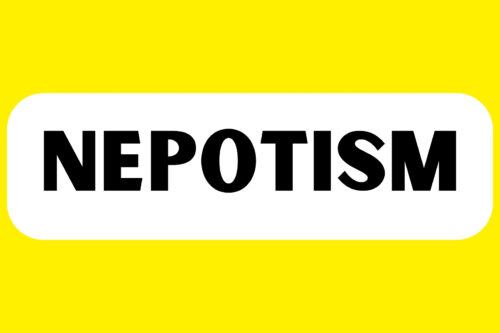
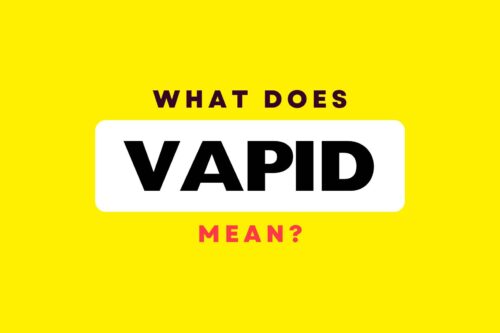
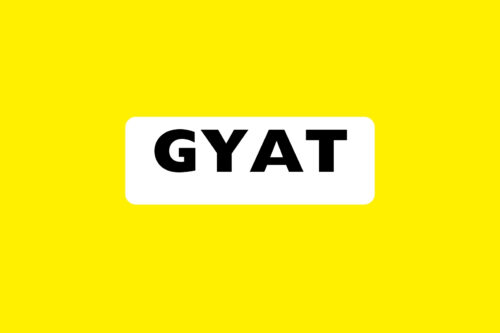
Leave a Reply